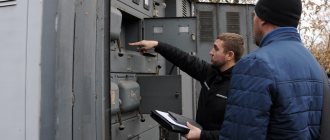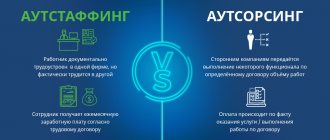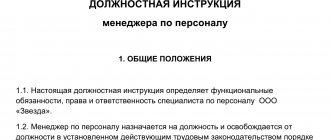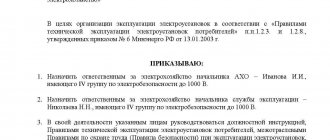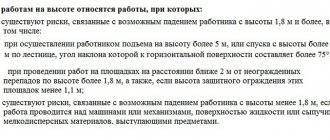On the territory of the Russian Federation, in legislative regulation and in the Labor Code there are no precise instructions according to which employees of an organization can be classified as core or auxiliary personnel.
However, business entities may issue local regulations with provisions governing the definition of the functions of support personnel.
What are primary and support personnel
The main criterion for dividing personnel into categories is their activities and the importance of the functions of a particular position in the work of the organization. Unlike the main staff, support staff are those workers who are engaged in performing tasks not related to the main activities of the company. Based on the actual functions performed by employees, they are divided into the following categories:
- Key personnel. Through its activities it brings direct benefits to the organization. This includes employees, without whom the normal functioning of the organization is impossible.
- Support staff. This category includes employees whose activities are not key to the enterprise. Without support staff, a business entity will be able to continue to function without loss of efficiency.
Support personnel are employees who perform additional functions that do not directly affect the company's core activities. The division of personnel into main and auxiliary personnel does not exclude the division of workers into other categories.
What professions are considered support personnel?
It is difficult to identify professions directly related to support personnel. The list of professions changes according to the areas of activity of the organization. Support personnel may be present in private and government agencies.
An example would be healthcare support staff. This includes employees who are not doctors. They provide other functions of institutions. Their activities help doctors and patients. In this area, support personnel include the following positions:
- nurses;
- orderlies;
- paramedics;
- catering workers;
- cleaners.
For commercial organizations, positions related to support personnel are determined directly by the employer. He independently forms the criteria and characteristics of this type of workers and regulates their activities.
What features are typical for support staff?
Support staff are an important element of an organization's structure. With its help, employers can resolve a number of possible difficulties in the company's activities. Nevertheless, there are a number of characteristic features that cannot be ignored.
Support workers are the first target when staffing cuts are needed. They actually do not affect the organization’s income, so they often reduce labor costs.
The activities of support staff can often be easily outsourced or hired under a service contract. It is not always cost-effective to keep these workers on staff.
Management must take into account that there is always a high turnover rate among support staff. But in comparison with the main personnel, this feature is not critical.
It is recommended to separate reporting into the results of the work of primary and support personnel. Sometimes considering the role of support staff in the overall performance of the organization does not make sense at all.
Which production personnel are considered auxiliary?
Production personnel includes workers and specialists, through whose actual activities the organization’s income is generated or its main functions are performed. Support staff may also be of the production type.
Manufacturing support personnel are employees who are not involved in production or providing the vital needs of the organization. But they affect the company's activities. These workers include cleaners, cooks in departmental canteens, cleaning services and others.
Guarding comfort and order: main characteristics of the service personnel category
The best of managers and the most talented of bosses most often remains “behind the scenes” for the company’s clients.
When coming to a restaurant, checking into a hotel, ordering food or planning an event, the service consumer first of all encounters representatives of the junior corporate level - the service staff. The cleanliness of the company’s premises, delicious coffee at the reception, served to the guest on time and at the right place, and a sincere smile from the salesperson work better than a well-structured marketing strategy. Service personnel are people whose daily, unnoticed work forms the basis for the comfortable existence of society. Knowing the specifics of the work of this category of employees is the task of every HR manager.
Administrative support staff
Administrative staff is aimed at organizing the main processes in the organization. The range of tasks is determined by the needs of a particular business entity. The scope of activities of employees classified as administrative personnel includes management functions, organizational and logistical issues.
Administrative support staff may include positions such as office manager, legal counsel, recruiter, and others, depending on the needs of the organization.
Which industries use support structures?
Today, almost all industries have auxiliary units on their staff. They have become part of huge industrial enterprises, private corporations and large capital firms, military-industrial complexes, and even in the field of education they are quite common.
Thanks to the peculiarities of their organization, they made it possible to remove the workload from the management team and distribute it among employees with a lower level of qualifications.
It often happens that it is not possible to maintain a permanent staff of employees to perform seasonal or other work that is temporary in nature, and then the technical staff of the enterprise comes to the rescue, performing this or that work after concluding a contract with them.
And when its validity period expires, the head of the organization makes cash or non-cash payments.
Which support personnel are included in the management team?
Management personnel ensures the targeted activities of the entire organization and coordination of the work of its individual divisions, departments, and production sites. This includes management staff:
- administration of the organization;
- office workers;
- management apparatus of the institution.
Management support personnel may include employees performing advisory activities in the management of the organization. But at the same time, their powers do not allow them to be classified as positions that directly support the functioning of the company or production, and the qualification requirements for employees are lower than for the main personnel.
Legislative framework of the Russian Federation
valid Editorial from 31.05.2011
detailed information
| Name of document | ORDER of the Ministry of Health and Social Development of the Russian Federation dated August 26, 2010 N 761n (as amended on May 31, 2011) “ON THE APPROVAL OF A UNIFIED QUALIFICATION DIRECTORY OF POSITIONS OF MANAGERS, SPECIALISTS AND EMPLOYEES, SECTION “QUALIFICATION CHARACTERISTICS OF POSITIONS” EDUCATION WORKERS" |
| Document type | order, directory |
| Receiving authority | Ministry of Health and Social Development of the Russian Federation |
| Document Number | 761N |
| Acceptance date | 01.01.1970 |
| Revision date | 31.05.2011 |
| Registration number in the Ministry of Justice | 18638 |
| Date of registration with the Ministry of Justice | 06.10.2010 |
| Status | valid |
| Publication |
|
| Navigator | Notes |
ORDER of the Ministry of Health and Social Development of the Russian Federation dated August 26, 2010 N 761n (as amended on May 31, 2011) “ON THE APPROVAL OF A UNIFIED QUALIFICATION DIRECTORY OF POSITIONS OF MANAGERS, SPECIALISTS AND EMPLOYEES, SECTION “QUALIFICATION CHARACTERISTICS OF POSITIONS” EDUCATION WORKERS"
IV. POSITIONS OF TRAINING AND SUPPORT STAFF
Duty officer (including senior)
Job responsibilities. Carries out constant monitoring of the behavior of students with deviant behavior on the territory of a special educational institution and beyond. Prevents violations of discipline and order. Monitors compliance with the daily routine and compliance with the rules of conduct by students. Identifies pupils prone to escapes and violations of discipline and carries out preventive work. While on duty, he checks vehicles entering and leaving the territory of the educational institution, as well as the cargo they carry, and keeps relevant records in the prescribed manner. Follows the instructions of the deputy director of a special educational institution for the regime or a representative of the administration in the event of unrest or in cases of indiscipline of individual students. Participates in the search for pupils who left a special educational institution without permission. Responsible for ensuring that students in the quarantine room comply with the daily routine and rules of behavior. In order to identify and confiscate unauthorized and prohibited items, things and food products from pupils, he carries out a personal search of pupils, as well as household, play and other premises with the drawing up of a report on the results of the search. Ensures the protection of life and health of students during the educational process. Complies with labor protection and fire safety regulations. When performing the duties of a senior duty officer on duty, he organizes the work of those on duty. In the absence of pupils during inspections, establishes the reason for their absence and location, and, if necessary, takes measures to find them and return them to a special educational institution. In the absence of the deputy director of a special educational institution according to the regime, he performs his duties.
Must know: laws and other regulations governing educational activities; Convention on the Rights of the Child; priority directions for the development of the educational system of the Russian Federation; regulatory documents on the work of a special educational institution; pedagogy, educational and developmental psychology; sanitary rules for the maintenance and regime of a special educational institution; basics of labor legislation; requirements for the protection of the rights of minors; internal labor regulations of an educational institution; labor protection and fire safety rules.
Qualification requirements. Higher vocational education or secondary vocational education and additional vocational education according to an established program without any work experience requirements.
For a senior duty officer - higher professional education or secondary vocational education and work experience as a duty officer for at least 2 years.
Counselor
Job responsibilities. Promotes the development and activities of children's teams (groups, divisions, associations) in various institutions (organizations) that work with children of different ages, including recreational educational institutions organized during the holiday period or operating on an ongoing basis (hereinafter referred to as institutions). Assists the teacher in programming the activities of pupils and children on the principles of voluntariness, initiative, humanity and democracy, taking into account their initiative, interests and needs. In accordance with the age interests and life requirements of pupils and children, he helps to update the content and forms of activity of the children's team, organizes collective creative activities. Together with the teacher and other employees of the institution, he takes care of the health and safety of pupils and children, creates favorable conditions that allow them to demonstrate a civic and moral position, realize their interests and needs, spend their free time interestingly and usefully for their development, using best practices in working with children and teenagers. Ensures the protection of the life and health of pupils and children during the educational process. Interacts with senior counselors, self-government bodies, teaching staff of educational institutions and public organizations. Complies with labor protection and fire safety regulations.
Must know: laws and other regulations governing educational activities; Convention on the Rights of the Child; fundamentals of developmental and special pedagogy and psychology, physiology, hygiene; trends in the development of children's public organizations; fundamentals of child developmental and social psychology; individual and age characteristics of pupils and children; the specifics of the work of children's public organizations, associations, the development of interests and needs of pupils and children; fundamentals of creative activity; methods of searching and supporting talents, organizing leisure activities; internal labor regulations of an educational institution; labor protection and fire safety rules.
Qualification requirements. Secondary (complete) general education and professional training in the field of education and pedagogy without any work experience requirements.
Assistant teacher
Job responsibilities. Participates in planning and organizing the life activities of students. Under the guidance of a teacher, carries out daily work that ensures the creation of conditions for their socio-psychological rehabilitation, social and labor adaptation. Together with medical workers and under the guidance of a teacher, he ensures the preservation and strengthening of the health of pupils, carrying out activities that contribute to their psychophysical development, and their adherence to the daily routine. Organizes, taking into account the age of students, self-care work, their compliance with labor protection requirements, and provides them with the necessary assistance. Participates in the prevention of deviant behavior and bad habits among students. Ensures the sanitary condition of premises and equipment. Ensures the protection of life and health of students during the educational process. Interacts with parents of students (persons replacing them). Complies with labor protection and fire safety regulations.
Must know: laws and other regulations governing educational activities; Convention on the Rights of the Child; fundamentals of pedagogy, psychology, developmental physiology, hygiene, pre-medical care, child rights, theory and methods of educational work; rules for protecting the life and health of pupils and child care; sanitary and hygienic standards for the maintenance of premises, equipment, inventory; internal labor regulations of an educational institution; labor protection and fire safety rules.
Qualification requirements. Secondary (complete) general education and professional training in the field of education and pedagogy without any work experience requirements.
Junior teacher
Job responsibilities. Participates in planning and organizing the life activities of pupils, in conducting classes organized by the teacher. Under the guidance of the teacher, carries out daily work that ensures the creation of conditions for socio-psychological rehabilitation, social and labor adaptation of pupils. Together with medical workers and under the guidance of a teacher, he ensures the preservation and strengthening of the health of pupils, carrying out activities that contribute to their psychophysical development, and their adherence to the daily routine. Organizes, taking into account the age of the pupils, their self-care work, their compliance with labor protection requirements, and provides them with the necessary assistance. Participates in the prevention of deviant behavior and bad habits among students. Ensures the condition of premises and equipment in accordance with sanitary and hygienic standards for their maintenance. Interacts with parents of students (persons replacing them). Ensures the protection of life and health of students during the educational process. Complies with labor protection and fire safety regulations.
Must know: laws and other regulations governing educational activities; Convention on the Rights of the Child; fundamentals of pedagogy, psychology, developmental physiology, hygiene, pre-medical care, theory and methods of educational work; methods of persuasion, argumentation of one’s position, establishing contacts with students of different ages, their parents (persons replacing them); rules for protecting the life and health of pupils and child care; sanitary and hygienic standards for the maintenance of premises, equipment, inventory, internal labor regulations of an educational institution; labor protection and fire safety rules.
Qualification requirements. Secondary vocational education without requirements for work experience or secondary (complete) general education and professional training in the field of education and pedagogy without requirements for work experience.
Secretary of the educational department
Job responsibilities. Receives correspondence received by the educational institution, transmits it in accordance with the instructions of the head of the educational institution to structural units or specific performers for use in the work process or preparation of responses. Conducts office work, including in electronic form; prepares draft orders and instructions on the movement of the contingent of students, draws up personal files of those accepted for training, maintains an alphabetical book of students and records of hours of educational work of employees of the educational institution, processes and formalizes the submission of personal files of students to the archive. Performs various operations using computer technology using programs designed to collect, process and present information. Monitors the timely review and preparation of documents, orders received for execution by structural divisions of educational institutions and specific executors. On behalf of the director (his deputy), he composes letters, requests, and other documents, and prepares responses to the authors of requests. Monitors the execution by employees of the educational institution of issued orders and instructions, as well as compliance with the deadlines for the execution of instructions and instructions of the head of the educational institution, taken under control. Works closely with the head of the educational institution (his deputies), teaching staff, and heads of structural divisions. Complies with labor protection and fire safety regulations.
Must know: laws and other regulations governing educational activities; regulations and instructions for record keeping; the structure of the educational institution, its personnel composition; rules for operating office equipment; rules for using intercoms, fax, duplicating device, scanner, computer; rules for working with text editors and spreadsheets, databases, email, browsers; technology for creating, processing, transmitting and storing documents; rules of business correspondence; state standards for a unified system of organizational and administrative documentation; rules for printing business letters using standard samples; fundamentals of ethics and aesthetics; rules of business communication; internal labor regulations of an educational institution; labor protection and fire safety rules.
Qualification requirements. Secondary vocational education in the field of office work without presenting a requirement for work experience or secondary (complete) general education and vocational training in the field of office work without presenting requirements for work experience.
Educational institution manager
Job responsibilities. Participates in drawing up a schedule of classes (lessons) and implementing operational regulation of the organization of the educational process and other activities in an educational institution, its divisions in accordance with the educational program of the educational institution, including the use of computer programs and technologies. Controls the provision of classes, groups, departments of an educational institution with the necessary premises, educational materials, information technology equipment, as well as transport. Carries out operational control over the progress of the educational process, ensuring the rational use of educational and extracurricular premises of the educational institution. Ensures compliance with sanitary standards and rules when scheduling training sessions. Identifies the reserves of the educational process by establishing the most rational modes of operation of information technology equipment, more complete and uniform loading of educational equipment and classrooms of the educational institution. Ensures the rational use of modern electronic means of operational management of the educational process in an educational institution. Maintains a dispatch log (electronic log), presents reports, reports and other information on the progress of the educational process. Participates in the work of assessing the lesson schedule in classes, groups, departments of an educational institution, and makes recommendations for its improvement. Works in close connection with deputy directors and heads of structural divisions of the educational institution, methodological associations of teaching staff. Complies with labor protection and fire safety regulations.
Must know: priority directions for the development of the educational system of the Russian Federation; laws and other regulatory legal acts regulating educational activities; Convention on the Rights of the Child; guidelines and regulatory documents relating to the planning and operational management of an educational institution; requirements for organizing the educational process and scheduling training sessions; psychological and physiological characteristics of different school ages; modern educational technologies; computer programs for organizing the educational process in educational institutions; fundamentals of ethics and aesthetics, rules of business communication; internal labor regulations of an educational institution; labor protection and fire safety rules.
Qualification requirements. Secondary vocational education in the field of labor organization without requirements for work experience.
How are support staff paid?
There are support staff in which the organization is interested, and therefore provides competitive remuneration conditions. These are engineers, operators servicing complex equipment, financiers, and lawyers. In other words, workers whose activities require certain experience and qualifications.
It is recommended to plan the remuneration of support staff by introducing an effective employment contract. It is recommended to provide for the possibility of differentiating wages through grading, bonuses and tariffs that directly depend on performance indicators and labor productivity.
The role of support staff in the activities of the organization
To understand who belongs to the support staff, you need to carefully study the specifics of the activities of a particular organization. The range of workers and employees who fall under this definition is quite wide. This type of worker includes both government employees and employees of private organizations.
The main feature of support personnel is the functions of work activity. They do not directly influence the main work of the business entity; their powers do not include making decisions that affect administrative management. Typically, their functions involve carrying out logistical activities on a regular basis. These measures are aimed at improving the functioning of the management of the enterprise and all its structures, helping the core staff, and ensuring optimal working conditions for all company employees.
In modern organizations, the entire staff structure implies the presence of employees performing support functions for their department. The activities of support staff make it possible to redistribute the workload of management among other employees with a lower level of qualifications (or no qualifications at all). It is safe to say that support personnel in the organization’s personnel structure are an integral part of the human resources necessary for the effective management of business entities.
Categories
To more fully understand this concept, it is necessary to consider its main categories. Thus, administrative personnel are not only top-level managers, but also lower-level managers.
Sometimes this term can have a broader meaning. For example, administrative and economic personnel consists of direct administrative and management workers, line and production personnel. This category should also include estimators, designers, employees of the housing and communal services sector and laboratories. At production enterprises, administrative personnel are engineering, technical and management employees, junior service personnel and employees employed in the management apparatus at production sites, and in auxiliary industries and service farms.


